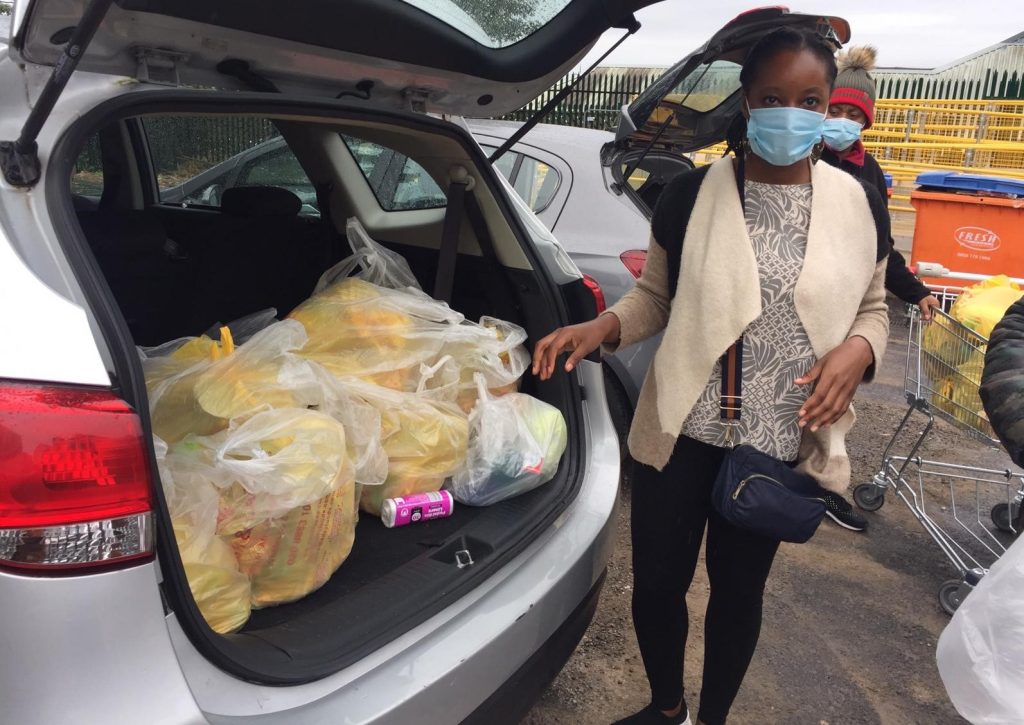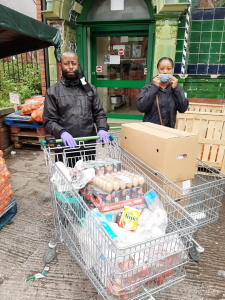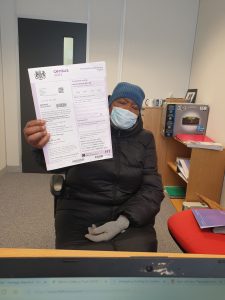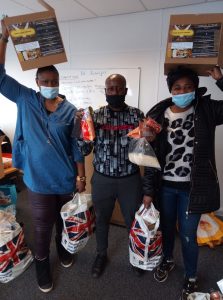
Elizabeth Tangata unloading food bank deliveries. Image: Warm Hut
A charity that works with refugees and asylum seekers in Salford, says demand for their services has increased dramatically during the pandemic.
Warm Hut, which mainly works with the French-speaking African community, set up a food bank during the first lockdown which originally ran only once a month, but as demand increased, now operates every two weeks.

Elizabeth Tangata, the Project Manager for Warm Hut, said: “When we first began, it was myself and my colleague who were the only people with cars, so when it was a complete lockdown, the two of us would buy the food and go from house to house, to the people we knew were really struggling, it was just so tiring, but now that we’re back in the office we’re encouraging people to come in.
“Every week we’ll see someone comes in and finds out about us, then they bring someone else they know is struggling, so the numbers of people coming to get food is higher and higher. People from different communities are starting to turn up now, such as Syria, so more and more we’re having to expand the kind of people we’re serving.”
Warm Hut has helped reduce feelings of isolation within the migrant community since 2009, a role that has become increasingly important during the pandemic.
Although they connect through online groups, and conduct virtual group exercise classes, Elizabeth says it is harder to combat feelings of loneliness amongst the elderly.
She explained: “They used to look forward to meeting in our big room for coffee and a chat, a chance to come out their homes, but we’ve moved online now and the older generation struggle with technology, you can teach them something today by next week it’s forgotten. For them it’s just a phone call, that’s all we can do to try to make them not feel so isolated.”
With the pandemic moving many services, including GPs, online, Warm Hut also had to create online accounts for the people in their community without computers or families nearby.
Elizabeth added: “It was so unfair when they needed to book appointments during the pandemic and were told to go online, you get all this panic because they don’t have a computer.
“The government just assume that everyone has access to computers and internet, and can use the IT equipment, but they’re forgetting we have some older people within our community who never went to school so can’t even read and write. They already have the language barrier, and then there’s the IT so it’s just really really frustrating.”
She believes the resumption of their IT and English classes will be increasingly important to help combat the isolation felt by those unable to take part in our ever digitised world, and Warm Hut recently acquired seven laptops thanks to Salford CVS’s digital fund to help this.
With the digital fund, we are able to support more families improve their digital skills and access more services and we could not do it without @salfordcvs
support. Thank you.#WeWillGetThroughThisTogether pic.twitter.com/dbqRWXcq4n— WarmHut UK (@WarmHutUK) January 28, 2021
Warm Hut also says their Homework club, which helps refugee and migrant children reach the same level as their English born counterparts, has become more vital as the move to the digital world disproportionally affected children from this community.

Elizabeth said: “The school closures are not just the meals, but access to IT equipment as well, refugee families don’t have the money to pay for internet or computers, and if you have two or three kids they all need their own IT equipment to study from home otherwise it’s just not possible.”
During the pandemic, Warm Hut have also had to translate important government messages for those who do not understand English, which included encouraging people from BAME backgrounds to complete the census and to get vaccinated, even hosting a vaccination centre themselves earlier this month.
Elizabeth said: “It’s not that the government is not getting the message across, but when it comes from people that look like you it makes such a big difference. We reach our communities more, because you know your own community, and you know what’s the best way to get them to understand what’s going on.”
Warm Hut was founded by Pipeeh Miyalu, an asylum seeker herself who wished to help others through the immigration process, and to settle into the area.

Elizabeth added: “We love it when we see people from the white communities supporting the work that we’re doing, some people say we’re discriminating if we only serve people from this community, but we serve them because they need that service.
“The white community already speak English, already know how to argue with their local government if they’ve done something that’s not alright, the people that we serve don’t even know their rights. The people that use our services can be so frightened, even at silly things like the misunderstanding of bills, and that’s the difference.”
They are currently looking for volunteers who speak both English and French, and although most of their funding comes from grants, individuals are invited to donate directly to them, either financially or through food bank donations.















Recent Comments